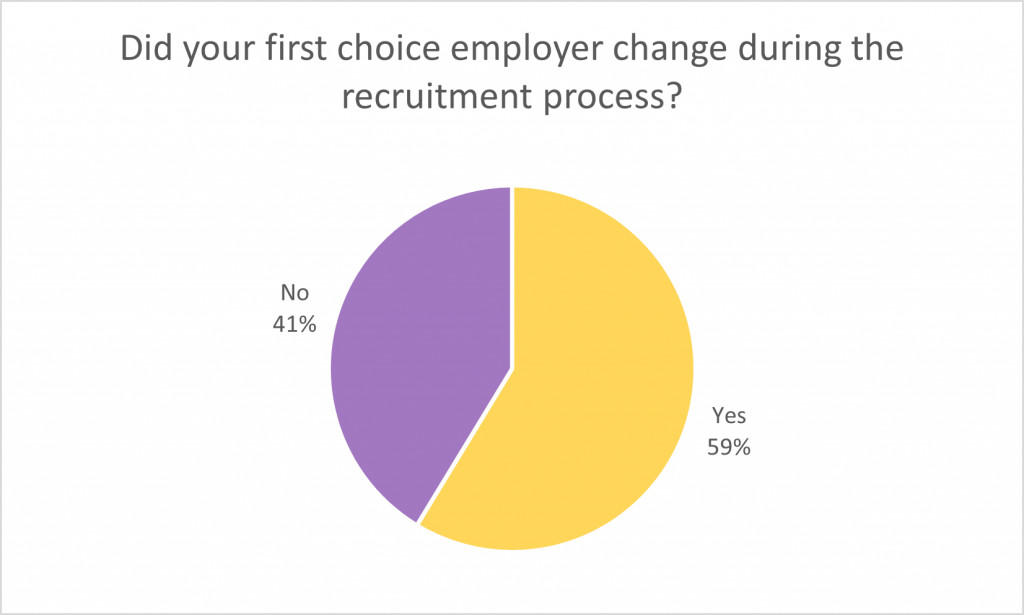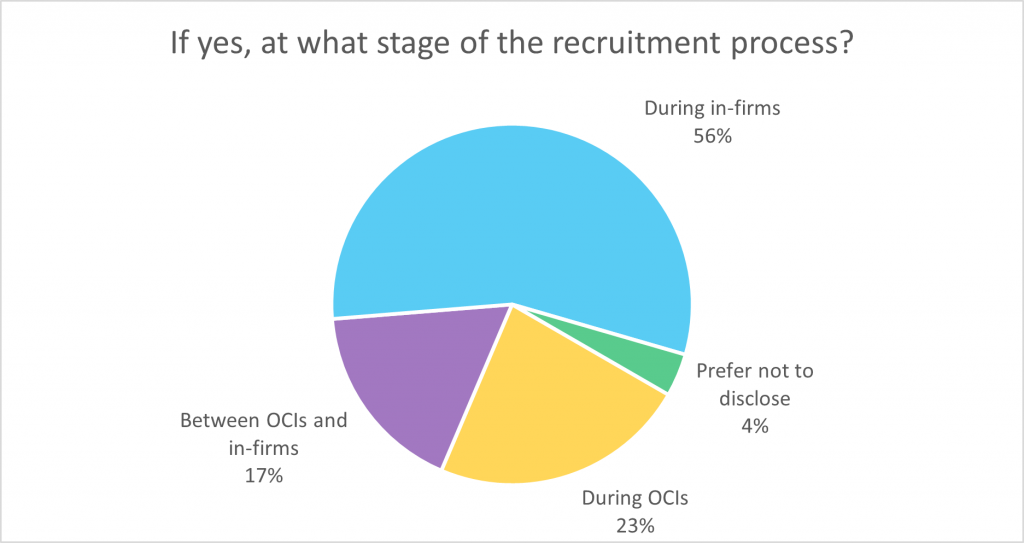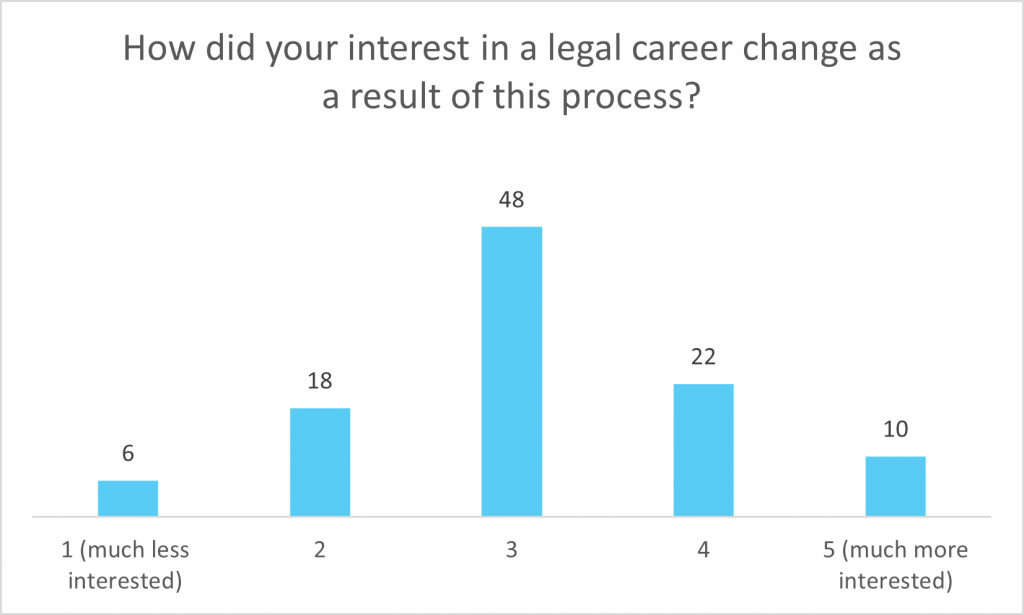Students share stories of inappropriate behaviour, tips for networking, and feedback on the recruitment process
As part of Ultra Vires’s annual recruit survey, we asked students questions about their experience navigating the unprecedented virtual 2L recruit. Students offered tips for success, feedback on the process, and expressions of interest throughout the process.
These comments have been edited for brevity and clarity.
Do you have any comments on the virtual events?
Most students did not enjoy the virtual events, citing awkwardness and Zoom fatigue:
- “I did not want to see which of my friends were competing for the same job.”
- “One firm did a ‘social’ and it was literally a webinar.”
- “200 people shoved into a Zoom room will not get to make any meaningful connections with one another.”
- “A firm rescinded an offer for a Day 2 callback that they gave me and sent me an email confirmation for, right after I participated in their virtual event. I have no idea if the virtual event itself (which felt like a very awkward chat) had any role in the decision.”
- “The virtual event was terrible because I felt like I had to be this outgoing, charismatic, knowledgeable person that I’m not (especially in group settings).”
But others enjoyed the virtual events:
- “The evening was an ask-me-anything but questions could be asked anonymously, which took pressure off of students.”
- “[Attended] a cool trivia event […] It was good to see the lawyers in a more natural environment.”
- “One firm had a coffee chat over the phone, which was much more relaxed and informal since I didn’t have to dress up.”
Did any of the employers ask you inappropriate questions or make you feel uncomfortable?
On pressure to say “first choice”:
- “I was told ‘this is the time to tell us if we’re your first choice.’”
- “One firm really pressured me. They called me on the last day of in-firms to again try to push me to say they were my first choice. They ended up calling me at 5:00 p.m. just to tell me they would not offer me a position.”
- “I got sat down a few times where it felt like they really wanted me to provide first choice language.”
Miscellaneous comments:
- “One firm asked me if I had experience caring for children.”
- “An interviewer told me they were uninterested in interviewing me.”
- “One firm asked me what my political leanings were and if I considered myself ‘left’.”
- “One employer insulted me and it really threw me off for the rest of my interview. She said it while laughing, as if it were a compliment, but the words were really mean.”
- “An OCI interviewer asked if I’d had “that smile plastered” on my face all day.”
- “One interviewer interrupted me and spoke over me throughout.”
- “They asked me about political events from my home country and it made me extremely uncomfortable as it’s not something that I enjoy talking to employers about.”
- “One firm assumed an interest in a particular practice area based on my identity, even though I had expressed different interests in my cover letter.”
What advice would you give to someone participating in the process next year?
On networking and preparation:
- “Network as much as you can ahead of time. It was easier for me in this virtual setting, so I tried to make the most of it. It helped me distinguish between firms.”
- “Go to events and try to connect with people. You may be surprised at just how friendly the lawyers are and how willing they are to speak with you.”
- “Prepare lots of questions.”
- “Start writing your resume and cover letter as soon as you can.”
- “Do more mock interviews.”
- “Demonstrating that you know what that firm does is invaluable. Finding ways to insert the ‘why this firm’ into your conversation is absolutely crucial, even if they don’t directly ask you the question.”
On “playing the game”:
- “Be aware that firms will lead you on and make you feel like a top candidate only to not call you at 5:00 p.m. To the extent that you can, don’t put all your eggs in one basket.”
- “Remember that you are the only one who has your best interests at heart. Firms may make you feel bad for not saying ‘first choice’ but at the end of the day, they will be okay regardless of what happens.”
- “Demonstrate more interest than you feel.”
- “Saying ‘first choice’ can be powerful. You should say it by mid to late Day 2 because this is often the difference between getting a third interview and not.”
On staying positive:
- “Go into it knowing the outcome doesn’t say anything about you.”
- “Breathe. It can be a very arbitrary process. Remember that at the end of the day you’re assessing them as well.”
- “Take it one step at a time and try not to compare yourself to anyone else.”
- “Have faith in yourself, Don’t be afraid of or discouraged from applying.”
On the importance of a supportive network:
- “Have upper year friends on standby to be your guide on how to signal interest and to cheer you on. They are invaluable.”
- “Speak with a trusted upper-year student who has gone through the recruit for advice and guidance.”
- “Have someone to talk to, especially an upper year.”
But most of all:
- “Make sure you drink lots of water.”
Alternatively:
- “Don’t participate in recruit. If you don’t want to.”
What did you not want your interviewers to know about you?
Responses varied:
- “How strong my leftist politics are.”
- “How much I have struggled to be motivated during COVID. I have felt so much frustration over the “business as usual” approach the Faculty has maintained throughout this period but I felt like I had to put on a bright face and “sell” the pre-pandemic version of myself during the recruit.”
- “That I hate everything their office stands for.”
- “The employer that ended up making me an offer called me three times before call day to make sure that their competitors hadn’t poached me. They were the only firm I had left.”
- “I was wearing sweatpants.”
What, if anything, would you change about the recruitment process?
Most suggestions involved removing using a student’s in-firm schedule to signal interest. Some also advocated for extending the in-firm timeline, a consistent email policy, and introducing a ranking system:
- “All employers should send out rejection emails once they decide they don’t like you so you can spend your time elsewhere.”
- “All intent to call emails should happen at the same time so we don’t spend days watching our email.”
- “[Evening] events should be banned.”
- “There should be an online ranking system for firms and students to save the awkwardness of being pressured to say first choice.”
- “Make it longer. There is no good reason why all in-firms have to happen in three days. Give us at least a full week, but cap the interviews at three per firm.”
- “Cancel all classes. Going to class Monday evening before 9:00 a.m. interviews on Tuesday was hell. Going to an evening class on Tuesday after having a full day of interviews was worse.”
- “Let them send us food.”
- “Most of it. With the amount of arbitrary net-casting and mind-games, I’d prefer if Cognomos simply assigned people to firms.”
- “Scrap this system and institute one which incentivizes fewer applications and interviews. This process is harmful and crushes so many deserving candidates and places an undue burden on people who already have to carry high debt-loads.”
Did you experience any employers not following LSO Procedures?
Some firms hinted strongly at an offer. One student’s comments stood out:
- “[A firm] told us we’d all be getting offers at their lunch on Day 3 that was literally called ‘top candidate celebration lunch’. They also encouraged us to cancel interviews with other firms, yet not everyone who was told this actually got an offer.”
Do you have any comments on the LSO Recruitment Procedures?
Many students commented on the power asymmetry between students and employers, and the resulting harms:
- “The whole thing was traumatizing. Having to make someone like you in 17 minutes? In-firms were not much better and […] waiting for emails, knowing you may never get a PFO [sic] email, was the worst part.”
- “The rules give firms all the power. Students are not in a realistic position to enforce them.”
- “In theory, it is nice they want to protect students; however, in practice they don’t make sense and are entirely unworkable. The largest issue is how offers are made.”
- “They hurt students. It gives employers the perfect excuse to play coy and give students the very strong impression that they’ll be getting an offer, with no obligation to actually follow through.”
- “Too stressful. The LSO needs to re-evaluate a process that has such a poor effect on mental health.”
- “This process is set up to cater to the egos of big firms in a quasi-battle Royale.”
Are you satisfied with the outcome of the recruitment process?
The responses were polarized:
- “Yes, I got my top-choice. That said, the process leaves you feeling drained, exhausted, and messed with regardless of the outcome.”
- “Yes, I wanted a position at a large, full-service firm and that’s what I got.”
- “No, I didn’t get a job after lots of interviews.”
- “No, somewhat paradoxically, I struck out entirely from the recruit but ended up getting an even more difficult-to-land position.”
Did your first-choice employer change during the recruitment process? If yes, at what stage?


How did your interest in a legal career change as a result of this process?

Of the 104 students who responded to this question, the most common answer landed halfway between “much less interested” and “much more interested.”
Some students felt inspired:
- “It was motivating to hear about how rewarding life could be post-law school. Corny but true.”
- “I was deeply touched by those whose dedication and passion for their job really shone through.”
- “I thought I wanted to be in a full-service firm to be exposed to different practice areas, in particular to try transactional work. I will be working at a litigation boutique.”
Some became more jaded:
- “Have you ever opened the mail and realized you got jury duty, and as you read the letter your heart sinks a little and you say ‘ugh shit’? Being a lawyer is just asking to get that letter every day.”
- “I did not like the people I spoke to. The emphasis was always on how much work there was and how prestigious it was, rather than the clients they supposedly should be helping. I don’t like being so removed from reality.”
Do you have any closing thoughts?
Responses were across the board:
- “Why do people think law students are superheroes? The fact that we get through this every year is not evidence that we get through it without giving up huge bits of ourselves in the process. It doesn’t mean we didn’t do it at the expense of our mental health, academic success, and general wellness. We’re asked to continually cater to and appease firms who end up treating us like statistics and make arbitrary choices. We can’t really be honest or ask the questions we want to ask. We are asked to do a lot, and it continually feels unfair. It shouldn’t have to be that way.”
- “Special shoutout to a firm […] who offered me a second interview in in-firms, told me to reserve a time spot for it, confirmed with me that time should be set aside for them, then ghosted me by never replying to my emails asking them to confirm the time or send a link. I always figured the recruit was like The Bachelor, but now that it’s virtual I suppose they thought it was time to make it more like Tinder.”
- “Don’t do 26 OCIs — it was very hectic and stressful.”
- “One of the partners joined a Zoom call late while I was chatting with the associate. I guess he didn’t realize his mic was on, because we heard something we shouldn’t have. He farted. LOUDLY.”
- “As an international student who has been in Canada for only 1.5 years and has never studied in an English environment before, I want to tell my fellow international students that you can do it.”
- “Everyone who’s been through or is in the process knows how difficult and somewhat demoralizing the process can be, so they will be willing to help you. Take advantage of that — and pay it forward when it’s your turn.”
Editor’s Note: Annecy Pang participated in the Toronto 2L Recruit this year. Survey respondents were permitted to opt out of answering any questions. The raw data was processed and aggregated by question before being given to the writers.





